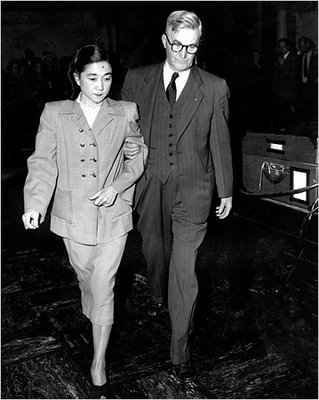Tokyo Rose R.I.P,
I first read about tokyo Rose in an old Esquire mag and even thought if she is part Pinoy or maybe married a Pinoy (I think her husband was Japanese also).
Here's NY Times' obit on Tokyo Rose:

Iva Toguri D’Aquino, the Japanese-American convicted of treason in 1949 for broadcasting propaganda from Japan to United States servicemen in World War II as the seductive but sinister Tokyo Rose, died Tuesday in Chicago. Mrs. D’Aquino, who served more than six years in prison but steadfastly denied disloyalty and received a presidential pardon in 1977, was 90.
Her death, at a Chicago hospital, was confirmed by a nephew, William Toguri, who said only that Mrs. D’Aquino had died of natural causes, The Associated Press reported.
Tokyo Rose was a mythical figure. The persona, its origin murky, had been bestowed by American servicemen collectively on a dozen or so women who, seductive but sinister, broadcast for Radio Tokyo, telling soldiers, sailors and marines in the Pacific that their cause was lost and that their sweethearts back home were betraying them.
The broadcasts did nothing to dim American morale. The servicemen enjoyed the recordings of American popular music, and the United States Navy bestowed a satirical citation on Tokyo Rose at war’s end for her entertainment value.
But the identity of Tokyo Rose became attached to Mrs. D’Aquino, a native of Southern California and the only woman broadcasting for Radio Tokyo known to be an American citizen. She emerged as an infamous figure in a rare treason trial.
Convicted in 1949 by a federal jury in San Francisco on one of eight vaguely worded counts, she was sentenced to 10 years in prison and a $10,000 fine. She served 6 years and 2 months, then lived quietly in Chicago, running a family gift shop. On Jan. 19, 1977, she was pardoned, without comment, by President Gerald R. Ford on his last full day in office, restoring her citizenship.
Here's NY Times' obit on Tokyo Rose:

Iva Toguri D’Aquino, the Japanese-American convicted of treason in 1949 for broadcasting propaganda from Japan to United States servicemen in World War II as the seductive but sinister Tokyo Rose, died Tuesday in Chicago. Mrs. D’Aquino, who served more than six years in prison but steadfastly denied disloyalty and received a presidential pardon in 1977, was 90.
Her death, at a Chicago hospital, was confirmed by a nephew, William Toguri, who said only that Mrs. D’Aquino had died of natural causes, The Associated Press reported.
Tokyo Rose was a mythical figure. The persona, its origin murky, had been bestowed by American servicemen collectively on a dozen or so women who, seductive but sinister, broadcast for Radio Tokyo, telling soldiers, sailors and marines in the Pacific that their cause was lost and that their sweethearts back home were betraying them.
The broadcasts did nothing to dim American morale. The servicemen enjoyed the recordings of American popular music, and the United States Navy bestowed a satirical citation on Tokyo Rose at war’s end for her entertainment value.
But the identity of Tokyo Rose became attached to Mrs. D’Aquino, a native of Southern California and the only woman broadcasting for Radio Tokyo known to be an American citizen. She emerged as an infamous figure in a rare treason trial.
Convicted in 1949 by a federal jury in San Francisco on one of eight vaguely worded counts, she was sentenced to 10 years in prison and a $10,000 fine. She served 6 years and 2 months, then lived quietly in Chicago, running a family gift shop. On Jan. 19, 1977, she was pardoned, without comment, by President Gerald R. Ford on his last full day in office, restoring her citizenship.





0 Comments:
Post a Comment
<< Home